For each of the four rows in Table 5101 organize and combine
For each of the four rows in Table 5.10-1, organize and combine the five columns of information together into one-to-two paragraphs that explain them in an easy-to-read format.
Table 5.10-1:
Risk Factor
(and Reason for
Significance)
Metrics
(and How Collected)
Risk Reduction/
Prevention Plan
Contingency
Plan
Entrance
Criteria
1. Requirements
stability.
(More people and
organizations (e.g.,
Navy, NATO) involved
means more time, more
requirements, and
requirements. instability
which leads to
cost/schedule slippage)
Track number of
requirements: original,
new, changed, deleted
(Count new, changed, and
deleted requirements every
month vs. previous month
by automated tool which
reads requirements
database)
Report requirements
stability with
written estimated
impact assessment
to all parties every
month and baseline
(freeze)
requirements at
planned time in
schedule
Reduce
functionality to
meet cost and
schedule or
increase funds and
schedule to
include
new/changed
requirements
If number of
changed req.
and number of
new
requirements
per month
exceeds 4
2: New Technology
(Learning curves for
OOD design techniques
and Ada language by the
development team will
take time; compiler
maturity for target
hardware (PCs) is low)
Count staff members
qualified in each discipline
(When staff member gets
minimum score on
OOD/Ada test or meets
other objective criteria)
1) Provide technical
training in OOD and
Ada;
2) Use and enforce
design and coding
standards
Employ OOD/Ada
expert
consultant(s) to
assist development
If the design or
coding
milestones fall
behind
schedule by
more than
15%
3: Reliability of
support organizations.
(Non-delivery of
required hardware and/or
materials will directly
impact on our ability to
deliver the complete system)
Production, installation,
and test milestones of each
required outside element
(Milestone progress
reports from all critical
suppliers and vendors)
Provide a bonus
structure to each
vendor and supplier
that is delivering a
required item for
delivering on time
Identify alternative
vendors and
suppliers and
purchase spares as
backup
Delta time
threshold over
2 weeks past
scheduled
delivery date
4: Overall system
testability.
(No test facility exists
that matches the real
system from beginning
to end as it exists in the
field.)
Percentage of Interfaces
tested and verified as
correct (Overall system
interface requirements
tracked through bi-weekly
status reports until
complete)
Develop a simulator
and test environment
that replicates as
nearly as possible
the whole system,
especially the
interfaces
Move testing to
field sites
If any required
interfaces
cannot be
tested in a
simulator
environment
by their
milestone due date
| Risk Factor (and Reason for Significance) | Metrics (and How Collected) | Risk Reduction/ Prevention Plan | Contingency Plan | Entrance Criteria | |
| 1. Requirements stability. (More people and organizations (e.g., Navy, NATO) involved means more time, more requirements, and requirements. instability which leads to cost/schedule slippage) | Track number of requirements: original, new, changed, deleted (Count new, changed, and deleted requirements every month vs. previous month by automated tool which reads requirements database) | Report requirements stability with written estimated impact assessment to all parties every month and baseline (freeze) requirements at planned time in schedule | Reduce functionality to meet cost and schedule or increase funds and schedule to include new/changed requirements | If number of changed req. and number of new requirements per month exceeds 4 | |
| 2: New Technology (Learning curves for OOD design techniques and Ada language by the development team will take time; compiler maturity for target hardware (PCs) is low) | Count staff members qualified in each discipline (When staff member gets minimum score on OOD/Ada test or meets other objective criteria) | 1) Provide technical training in OOD and Ada; 2) Use and enforce design and coding standards | Employ OOD/Ada expert consultant(s) to assist development | If the design or coding milestones fall behind schedule by more than 15% | |
| 3: Reliability of support organizations. (Non-delivery of required hardware and/or materials will directly impact on our ability to deliver the complete system) | Production, installation, and test milestones of each required outside element (Milestone progress reports from all critical suppliers and vendors) | Provide a bonus structure to each vendor and supplier that is delivering a required item for delivering on time | Identify alternative vendors and suppliers and purchase spares as backup | Delta time threshold over 2 weeks past scheduled delivery date | |
| 4: Overall system testability. (No test facility exists that matches the real system from beginning to end as it exists in the field.) | Percentage of Interfaces tested and verified as correct (Overall system interface requirements tracked through bi-weekly status reports until complete) | Develop a simulator and test environment that replicates as nearly as possible the whole system, especially the interfaces | Move testing to field sites | If any required interfaces cannot be tested in a simulator environment by their milestone due date | |
Solution
The answer is given in the paragraph form according to the information which is given in the table only.
1. Requirements stability.
The first risk factor is stability of requirements. In this more people and organizations like Navy, NATO etc. are involved which leads to increase the time factor. And because of this the number of requirements get increases. This will results into Instability which leads to slippage of cost/schedule. Now, this is collected by Tracking the number of requirements which can be original, new, changed or deleted and this can Count new, changed, and deleted requirements in every month vs. previous month by automated tool which reads requirements database.To reduce the risk factor, Report of requirements stability with written estimated impact assessment is prepared and send to all parties in every month and baseline or freeze requirements at planned time is scheduled. To plan the contingency functionality can be reduced to meet cost and schedule or increase in funds and schedule to include new/changed requirements can be done. For entrance criteria the number of changed requirements and number of new requirements per month should exceeds 4.
2: New Technology
The second risk factor is New Technology. This includes the learning of curves for OOD design techniques and Ada language by the development team. And this will take time which compiler maturity for target hardware (PCs) low. Now how it is collected? So, in this the staff members are counted who are qualified in each discipline on the basis of getting minimum score on OOD/Ada test or meets other objective criteria. The risk can be reduce by providing technical training in OOD and Ada and with the help of use and enforce design and coding standards.The contingency plan for this is to Employ OOD/Ada expert consultant(s) to assist the development. And the entrance criteria for this is, the design or coding milestones fall behind schedule by more than 15%.
3: Reliability of support organizations
Now, the third reason for significance is reliability of support organizations which includes non-delivery of required hardware and/or materials which can give direct impact on our ability to deliver the complete system. And it is collected through the production, installation, and test milestones of each required outside element i.e. reports of milestone progress are collected from all critical suppliers and vendors.To prevent the risk, a bonus structure is provided to each vendor and supplier that is to deliver a required item for delivering it on time. The contingency plan for this is to Identify the alternative vendors and suppliers and purchase spares as a backup. And the entrance criteria for this is, the Delta time should threshold over 2 weeks past scheduled delivery date.
4: Overall system testability.
The fourth and the last risk factor is overall system testability. The reason behind the significance is there is no test facility exists that matches the real system from beginning to end as it exists in the field only. It is collected through the percentage of Interfaces tested and then verified as correct that means Overall system interface requirements are tracked through bi-weekly status reports until complete. This risk can be reduced by developing a simulator and test environment that replicates as nearly as possible the whole system, especially the interfaces.The contingency plan for this is to move the testing to the field sites. And the entrance criteria for this is any required interfaces cannot be tested in a simulator environment by their milestone due date.

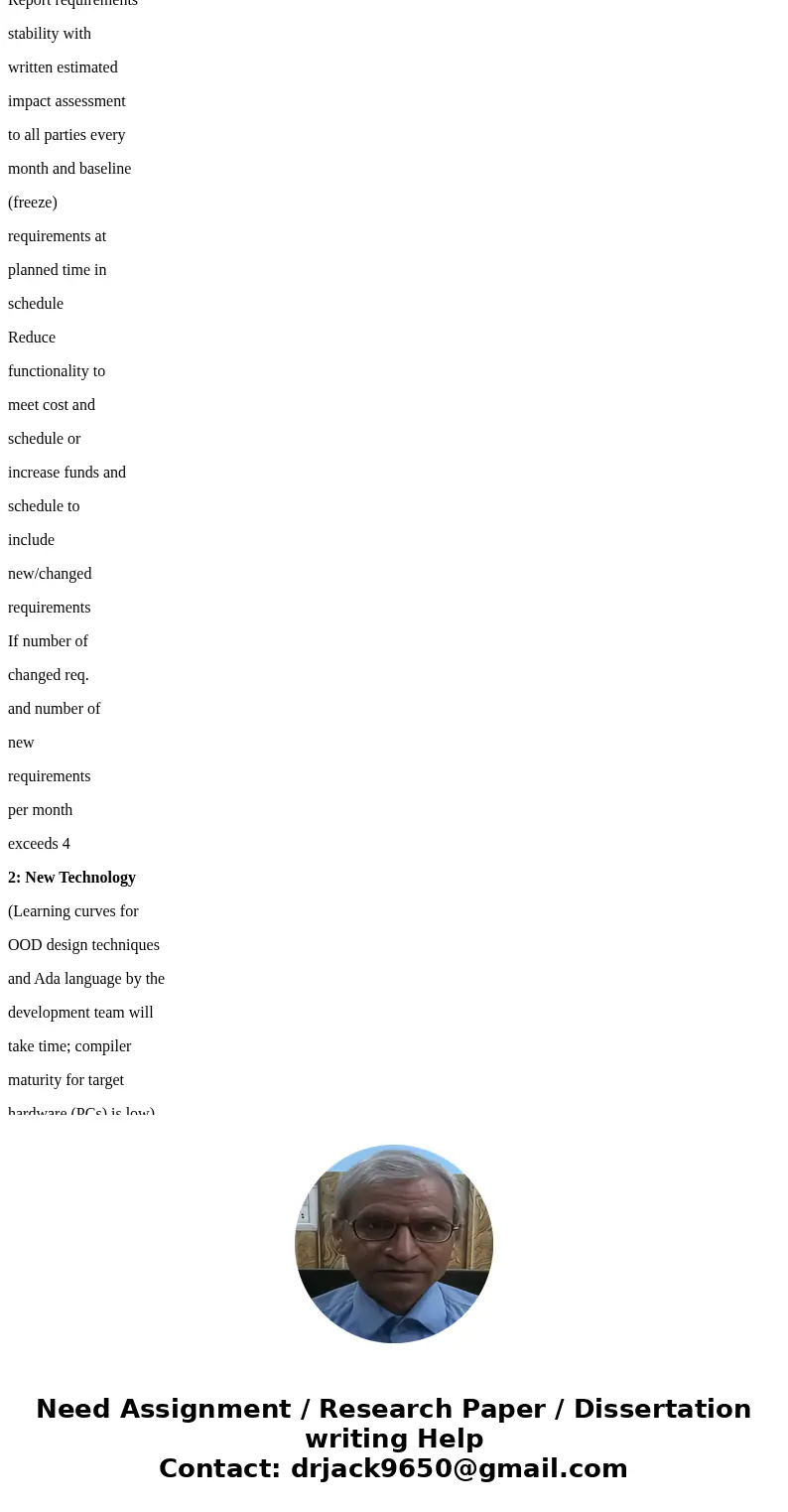
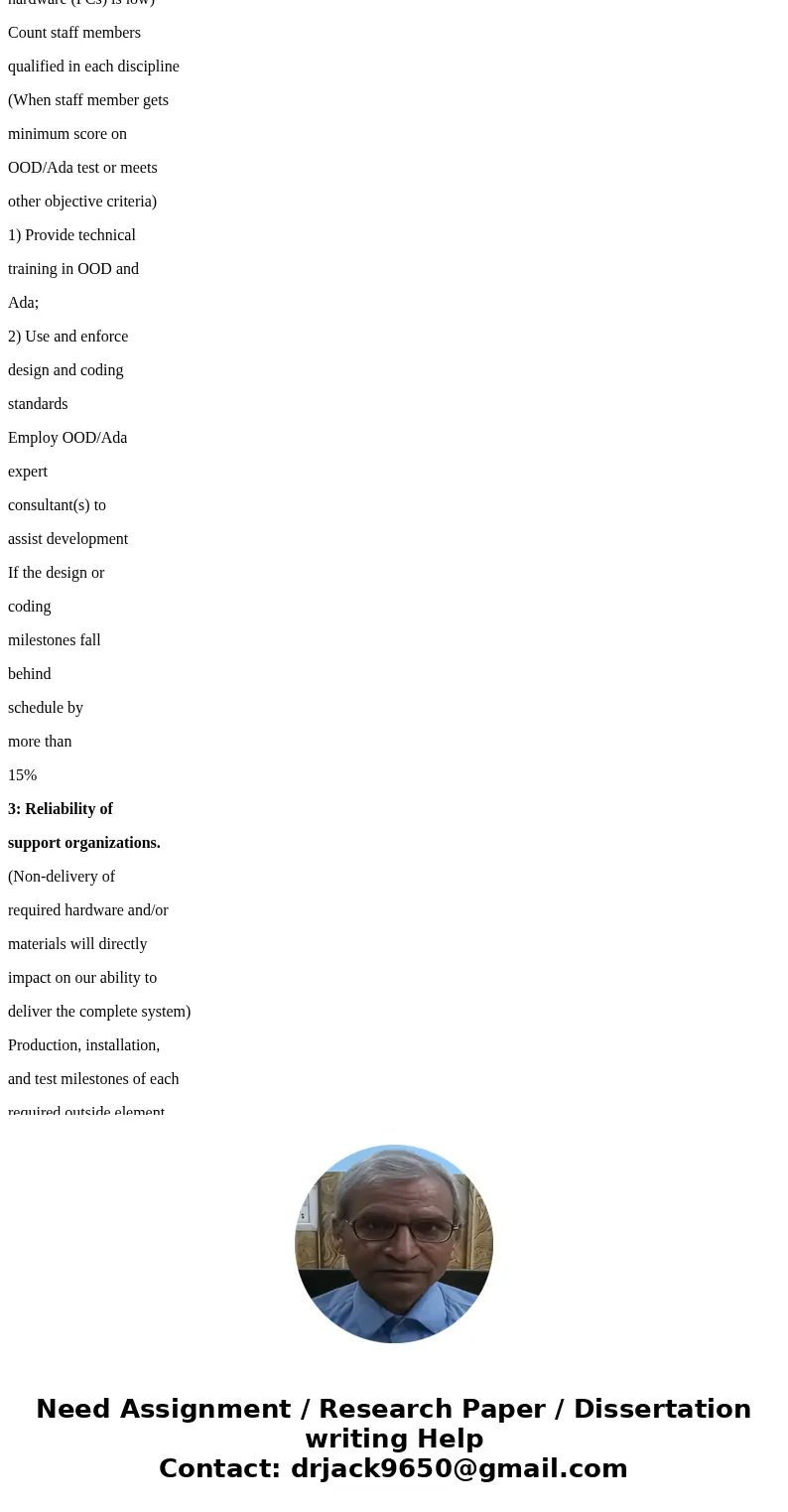
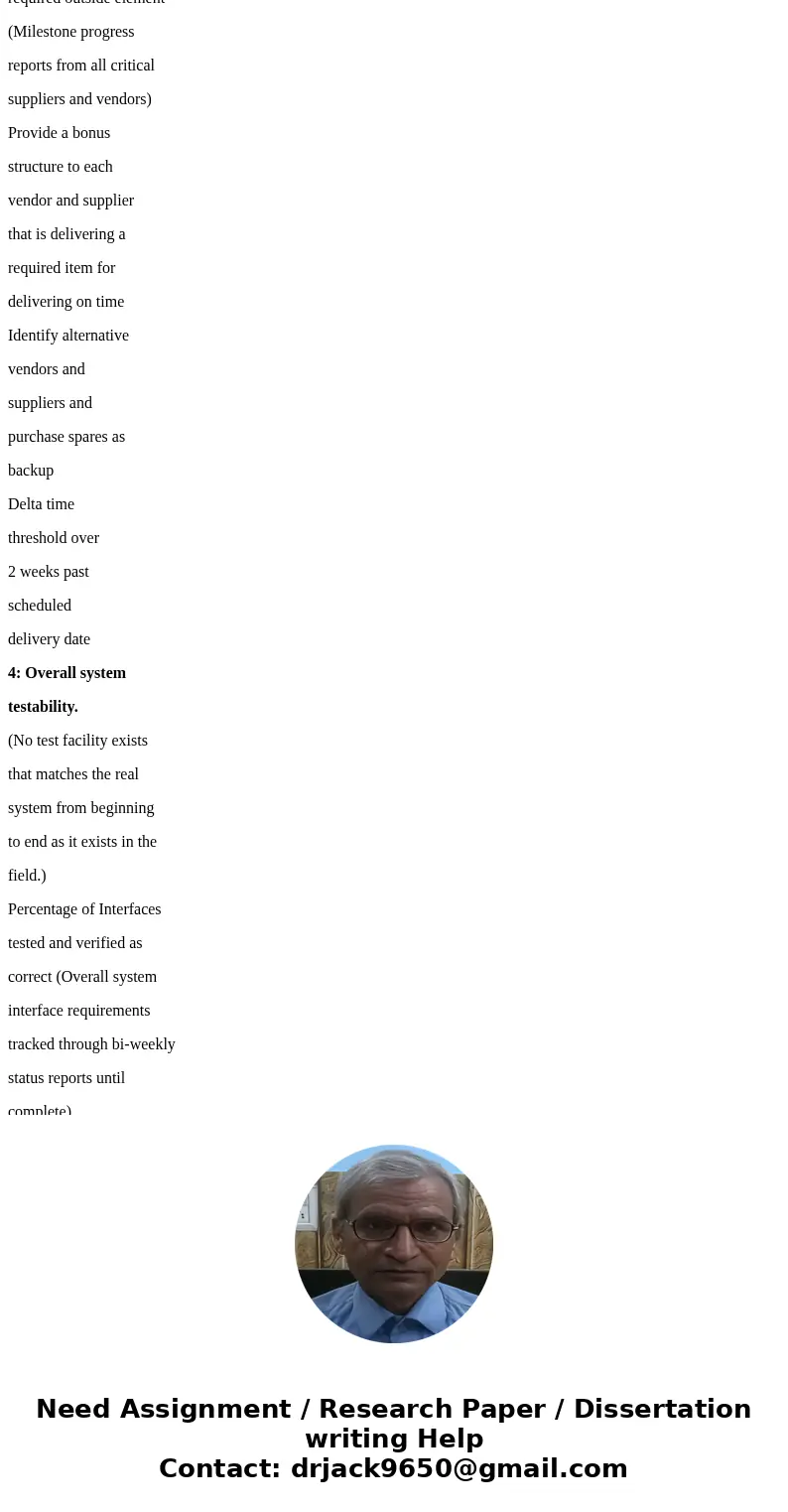
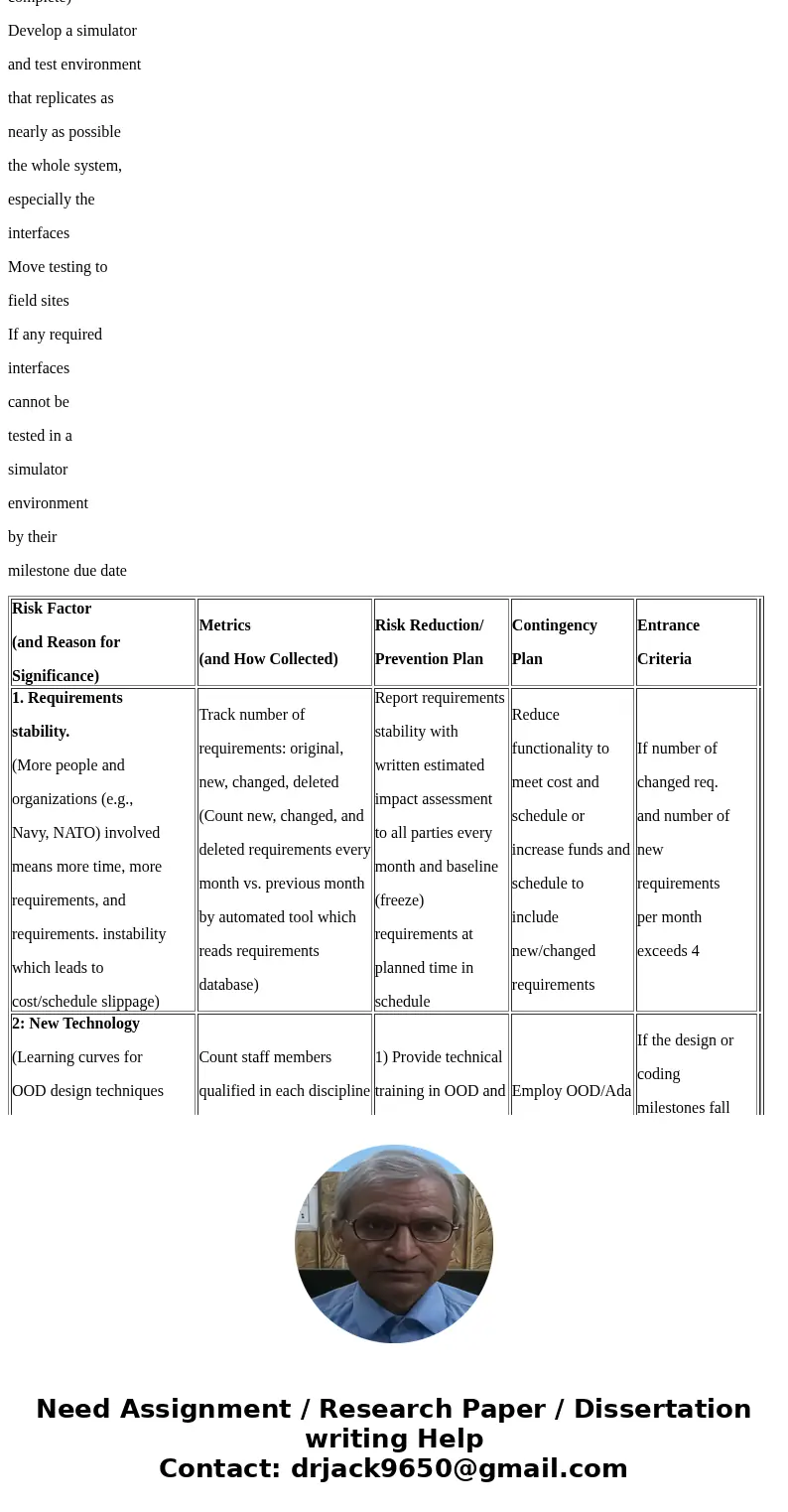
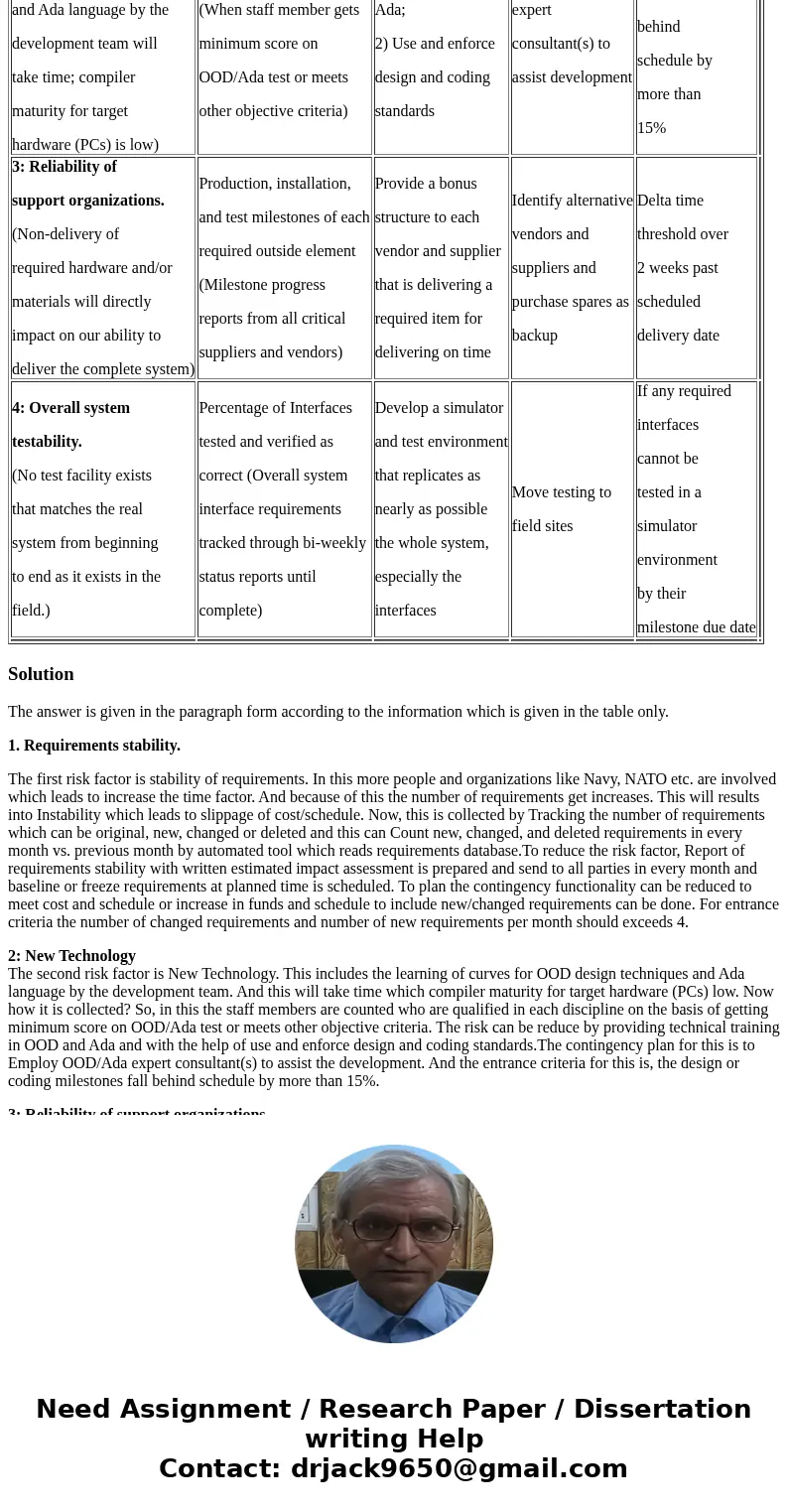
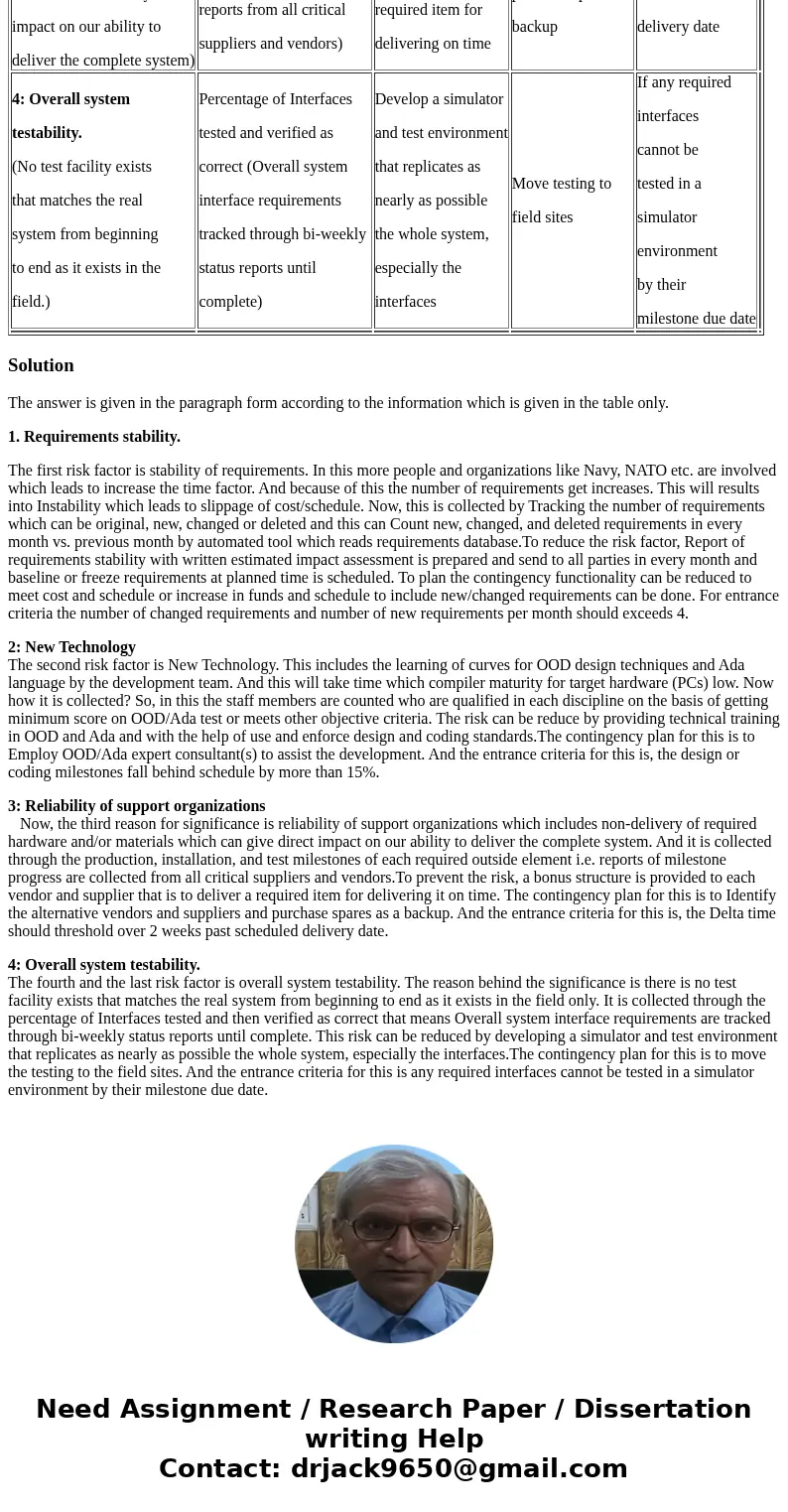
 Homework Sourse
Homework Sourse